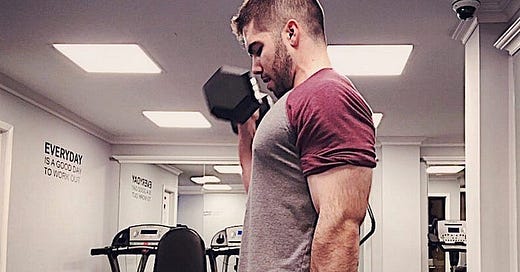In a world more connected than ever before, depression continues to climb.
For many of us, it can feel like an endless battle with no victory in sight, pulling us further downwards into despair.
Nearly 15 years ago, depression pulled me to the lowest point of my life.
I felt like I had no control over any aspect of my life, and I wanted out of this constant pain.
I ended up at a crossroads: either I was going to get consumed by my depression… or fight back with whatever I could.
My hard-headed self chose the latter.
The first thing I believed I could take control of in my life was my body.
I was always inspired by athletes and their physical feats: of the underdog that came from pretty tough lives… and overcoming.
Although I didn’t believe I could do some of these things, I wanted to work towards building a better me.
So I started exercising, and something interesting happened.
My body didn’t initially change for months… but my mood would with every workout session.
There were moments when the depression was gone for hours at a time because of exercise.
I liked what I was experiencing, so I chased this.
It was the best decision I’ve ever made.
Today, I wanted to share with you how exercise can be a powerful tool in battling depression.
Let’s dive in!
5 Ways Exercise Can Help You Battle Depression
1. It May Boost Serotonin, Dopamine, and Endorphins
Lift to LIFT Your Mood, baby.
One recent study took young adults with major depressive disorder (MDD) and Generalized Anxiety Disorder (GAD), and had them resistance train (ie. lifting weights).
These young adults only exercised two times per week for 25 minutes per session for 8 weeks.
As a result, they found massive improvements to MDD and GAD, to levels similar to the effects some people get from anti-depressants.
This is HUGE because just a tiny bit of exercise can be a powerful tool for you to utilize outside of medication and therapy.
And you don’t need the most perfect or structured program to do it.
All you need to do is put in a tiny bit of work in any exercise of choice: walking, swimming, weight lifting, or even a group class.
I like the thought of “sweating for serotonin”.
If you don’t sweat, “move for a better mood” ;)
Getting that feel-good rush after every workout session is something we can pursue in our day-to-day lives if we need a lifted mood.
2. It May Reduce Stress & Build Stress Resilience
Increasing evidence shows that stress and depression may potentially be connected with one another.
As such, one powerful stress-reducing tool in our arsenal is exercise.
Studies indicate that exercise is a powerful tool in reducing & managing stress.
However, exercise has also been shown to potentially help improve resilience to stress as well!
One study found that exercise is also associated with cognitive improvement and stress resilience.
Similar to how you get stronger physically in the gym, the strenuous load of exercise can potentially help you become better capable of handling stressors.
In fact, some believe that exercise can be a powerful tool in cultivating both mental & emotional resilience.
Personally, without exercise, I would’ve aged rather quickly from the stress of working as a manager at one of my jobs post-college.
50–60 hour work weeks and managing 4 locations simultaneously was miserable.
However, I believe exercising frequently during this time helped me better handle stress (along with trying to get quality sleep and breathing exercises).
It didn’t reduce all of the stress, but it was a lot easier to manage had I not frequently exercised.
3. It May Improve Self-Esteem
For both young and old adults, exercise has been show to help improve self-esteem.
At the start of my journey, it was really hard to see notable progress in the mirror for a few months.
However, focusing on the mood-boosting benefits of exercise kept me going.
I noticed I was getting stronger.
And then finally, after 3 months, I noticed the weight loss and I was HOOKED from there.
My non-existent self-esteem started to grow alongside the exercise journey I was on.
From this, I believed that if I could build my body, I could improve and expand my mind in some way as well.
This drove me into a journey of personal growth that I’ve been on for nearly 15 years now.
4. It May Support Social Interaction
In a more connected world, we are more lonely and depressed than ever before.
I believe a large part of it is feeling that connection towards something greater than ourselves, and many of us are starved for this.
According to research, having a powerful social bond with your family or group can have a positive impact on your mood and well-being.
And exercise can be a powerful tool in this bonding experience.
When I started weightlifting, I kept showing up at the gym at the same times every day.
I would notice the same people coming in, and the usual “head nod” would follow it.
Overtime, I started to meet many in there, and then the gym became a place where I not only put in the work, I had fun.

No matter what gym you go to, or the style of exercise you do: if you show up at the same time regularly, you’ll meet people, socialize, and befriend them.
For myself, I started with weight-lifting and befriended many lifters going at the same times.
I have the same experience training Jiu-Jitsu: being around not only the other members of class, but other gyms coming to ours to train as well.
My brother also owns a powerlifting gym I frequent, and EVERYONE knows each other because they bond by a similar interest.
While I am not a powerlifter, I enjoy lifting weights there because everyone is friendly because they love the culture.
5. It May Fuel Purpose
Lastly, I wanted to share with you one of my favorites I found with exercise.
Exercise can potentially fuel your purpose.
According to a 2021 study, researchers found that exercise was linked to a stronger sense of purpose.
The researchers found a bidirectional relationship between exercise and purpose, where people who had a strong sense of purpose exercised frequently, and those who started without a strong sense of purpose found, developed, and maintained it through exercise.
Personally, I call exercise the catalyst for my own mental health journey.
It gave me something to work towards, something to challenge myself in, and something that brought me some happiness.
Eventually, this grew into me pursuing more self-development, building social connections, building my career, and more.
Maybe you may feel like you were meant for something bigger, and something as little as exercise can’t be it.
But sometimes, something as simple as movement has meaning.
I believe something as simple as exercise can be the start of your purpose-filled journey.
You can always find that purpose beyond the movement in a clearer and happier headspace.
Movement Has Meaning
If you aren’t exercising consistently, now is the time to get into the habit of adding it to your lifestyle.
Remember, you don’t even need to commit too much time to it.
When you need a mood lift, choose to go outside for a walk, or go lift weights for a 30-minute session.
It can be all you need to start.
Then, you can add some more structure to your workout routine once you’ve built a habit out of it.
And if you’re already using exercise as a tool, remember: a healthy balance of exercise and recovery is important for your mental health.
More intense exercise will not make it better, as recovery is just as important.
From here, explore other tools to manage your depression: from therapy to self-reflection, and beyond.
Thank you for reading, and I hope this inspires you to keep on in the pursuit of becoming better and seizing a greater life for yourself.
Until next time!




